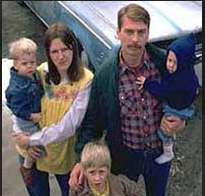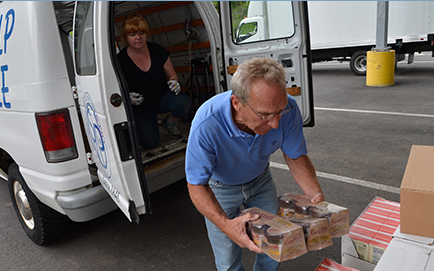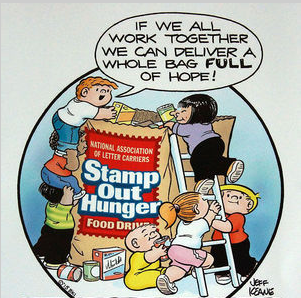
I was recently involved in a discussion that was related to helping people with specific needs, in this case food, and it quickly became a blame game when people chimed in that were of the opinion that everyone needs to do everything on their own, and that it is our own fault if we are in a situation that requires us to ask for help.
 I believe that there are situations when people receive things such as public assistance that may not need it, and am not one to advocate for this type of needless assistance, but I also know that there are situations when people need help that cannot get it. Sometimes people need a temporary hand-up but have nowhere to turn because they do not qualify for government assistance and may not know where else to go. And private organizations that provide assistance to anyone are sometimes hard to find and can be depleted of goods and funds, especially this time of year.
I believe that there are situations when people receive things such as public assistance that may not need it, and am not one to advocate for this type of needless assistance, but I also know that there are situations when people need help that cannot get it. Sometimes people need a temporary hand-up but have nowhere to turn because they do not qualify for government assistance and may not know where else to go. And private organizations that provide assistance to anyone are sometimes hard to find and can be depleted of goods and funds, especially this time of year.

Manchester is not an easy place to be if one has a real need, especially if it is temporary or urgent in nature. My feeling is that churches and faith-based organizations should be the first lines of defense, but in many cases aren’t for many reasons – including their limited resources. The next group of organizations, (non faith-based nonprofits such as food banks or soup kitchens), also have limited resources but do all that they can as well. So this leaves us with the city welfare department, the agency that is supposed to help people.
What is interesting to me about the Welfare Department is that less than 20 percnet of its 2015 budget actually went to assisting people. Why did the city spend over $1 million on a department that has the purpose of helping the citizens of Manchester when less than $202,000 of the money was used for assistance? In comparison, almost $700,000 of the same budget went to payroll, (listed in budget as regular salary). The government shouldn’t be the first line of defense for assistance, but since we should “help” people in need and do spend money so the city can assist, shouldn’t we see more of the funds go directly to those in need?
Isn’t there a better way to distribute the funds?
Back in the summer of 2009 there was a couple with two young boys, (ages 4 and about 10 weeks), who had experienced a job loss because of the economic downturn. They had used up what little severance was given to them and unemployment was just starting, so they needed some emergency help with paying their next month’s rent. The couple had worked with the property management company and were making weekly rent payments to avoid eviction, and they had exhausted all other financial means so called 611 and were given the number for city welfare. As a last resort they contacted the office and were given an appointment. The couple went to the city welfare office with all requested documents, hoping to get emergency / temporary help. Instead what they got was a series of roadblocks and little to no compassion. When a social worker did finally meet with them, they were told that they would need to log every purchase and if at any time the welfare department felt that they were not spending money correctly they would be removed from the list and would not receive assistance. The couple was not asking to be put on the system; they just needed temporary help so that they could remain in their apartment with their young boys. They did not receive any help from the city but were able to find other means to pay rent for that month; otherwise they would have become a family on the streets.
That family was mine.
Growing up we did everything that we could to make it on our own, and I was always taught that one was to never become dependent on the system. So it took a lot for me to ask for public assistance. Doing so was a wake-up call. The experience showed me that the system doesn’t help those who actually need it in Manchester.
I understand – and have witnessed – abuse of the system. It is frustrating when I see blatant abuses of the system and think of my four-hour daily commute so that my family can be provided for. But I also know that there are people who need help. Many people that I’ve met who need help are willing and able to work but simply need a hand-up. These are the people who are often forgotten or left behind.

We need to look at the current city welfare system and find ways to make it function better. The first thing that we should do is make it less top-heavy, budget wise. If the true purpose is to help people then most of the funds need to be used for that and not for things like salaries and “management services.”
It’s no secret that non-governmental organizations (NGOs) as well as nonprofits, are more efficient and spend their funds more wisely, which makes them more effective in helping those in need. For example, the Salvation Army typically spends 82 percent of its donations on aid.
Maybe we need to make a bold move and use the funds allocated for public assistance and distribute it amongst a couple NGOs and allow them to handle the need. This would mean eliminating the Welfare Department, but is it truly needed if it is not actually helping people? If we spend this money from the city’s budget, which is funded by the people, for the purpose of giving a hand-up, shouldn’t it be used for that? Of course we need to be sure that there are restrictions to ensure that help is temporary and goes to those who have demonstrated need. The NGOs would enforce the regulations and have oversight to ensure that guidelines are being followed.
City welfare should be a short-term safety net that gives people a hand-up when they truly need it. It may take bold action, but the funds that we set-aside can be used for that – we can help people who need it. Welfare can function properly; we just need to make some changes.
 About the author: Brian Chicoine is a New Hampshire native who moved to Manchester from Raymond in 1980 at the age of 8. He attended Gossler Park Elementary, Parkside and Southside Junior High, and West High, from which he graduated in 1990. After attending Notre Dame College in Manchester, Brian completed his undergraduate degree at Rhode Island College in Providence. Brian and his wife Jackie then came to Manchester in 2004 and were involved in various outreach organizations. Their two boys were born in Manchester during this time. After his position was eliminated in 2009, Brian and his family returned to Rhode Island. They have been living in Providence since 2010. Brian and his family love Manchester and are planning on returning within the next few months. Brian is currently working at helping the city move forward by connecting with other stakeholders and becoming involved with like-minded groups. Brian is also laying the foundation for an organization that will help strengthen the city and help it move forward.
About the author: Brian Chicoine is a New Hampshire native who moved to Manchester from Raymond in 1980 at the age of 8. He attended Gossler Park Elementary, Parkside and Southside Junior High, and West High, from which he graduated in 1990. After attending Notre Dame College in Manchester, Brian completed his undergraduate degree at Rhode Island College in Providence. Brian and his wife Jackie then came to Manchester in 2004 and were involved in various outreach organizations. Their two boys were born in Manchester during this time. After his position was eliminated in 2009, Brian and his family returned to Rhode Island. They have been living in Providence since 2010. Brian and his family love Manchester and are planning on returning within the next few months. Brian is currently working at helping the city move forward by connecting with other stakeholders and becoming involved with like-minded groups. Brian is also laying the foundation for an organization that will help strengthen the city and help it move forward.
Brian holds a Bachelor’s degree from Rhode Island College and a Master of Public Administration degree from Grand Canyon University. Brian currently works at Boston Children’s Hospital. He is also founder of a Facebook Group, Manchester Forward. You can contact him at brian.chicoine1636@gmail.com.

You’re one click away! Sign up for our free eNewsletter and never miss another thing







